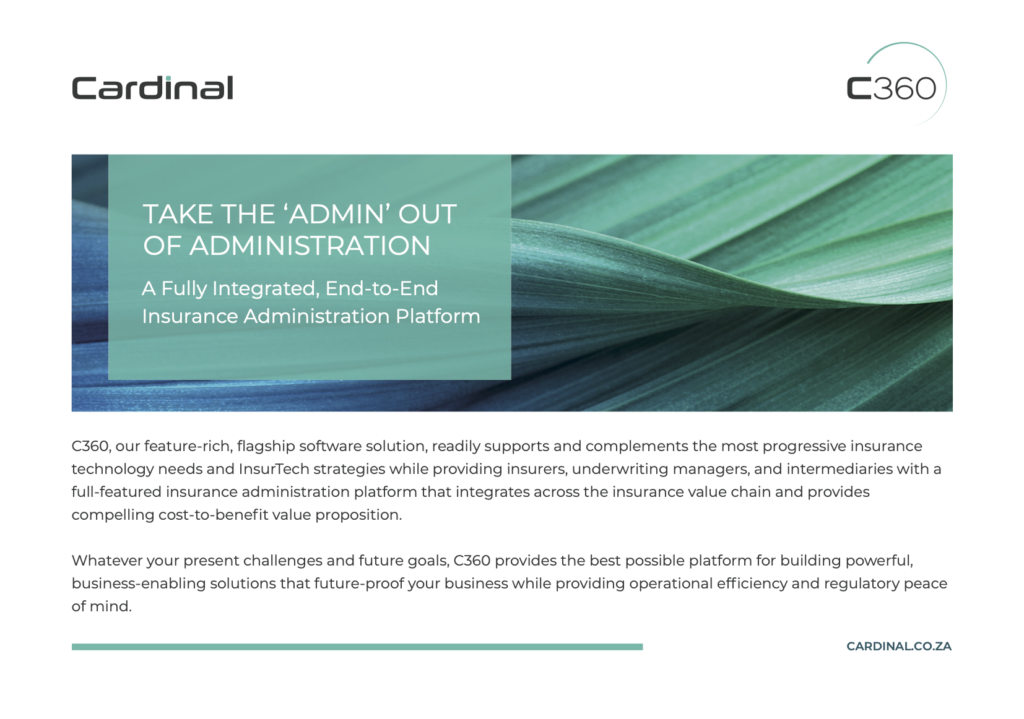Graham Harvey, CEO, Cardinal
In today’s dynamic insurance environment, technology has firmly established itself as a key driver of business transformation. What was once relegated to a back-office function has now taken center stage in boardrooms, shaping decision-making and business strategies.
“Every business is a technology business,” is a sentiment that particularly resonates in the insurance industry, where technology enables businesses to scale, innovate, and respond to evolving customer needs.
When reflecting on the shifts in technology’s role, the perception of IT has evolved. Back in the nineties, IT was a department that did not really get airtime in the boardroom. Today, it is front and center, as businesses realise that technology is intrinsic to their operations. This realisation has pushed organisations, including insurance firms, to embrace more comprehensive technology ecosystems, moving beyond standalone systems to integrated, flexible platforms.
Our latest venture into business intelligence (BI) reflects this shift. Initially, Cardinal was a policy administration system handling policies and claims. However, as insurance businesses transitioned into larger ecosystems, Cardinal adapted by integrating more sophisticated products and services, aligning with the evolving needs of its clients. We realised we needed an ecosystem of technology. This transformation included taking a stake in Codeplex, a service provider management tool, and collaborating with other technology companies to enhance their offerings.
A key partnership that has emerged from this shift is with a BI specialist, who has worked with Cardinal over the last eight years to harness the power of data for decision-making. Leveraging tools like Qlik Sense, QlikView, and Power BI, they’ve helped visualise data for robust decision-making. This collaboration has added a new layer of value to Cardinal’s insurance software, helping clients leverage their data more effectively for reporting and analysis.
With data becoming an increasingly critical asset for insurance companies, BI tools are essential for interpreting vast amounts of information. BI tools help visualise and analyse data, enabling more informed decision-making. These tools allow organisations to manage large datasets efficiently, especially when data is stored across different platforms, and to derive actionable insights that can improve business performance.

TAKE THE ‘ADMIN’ OUT OF ADMINISTRATION.
Whatever your present challenges and future goals, C360 provides the best possible platform for building powerful, business-enabling solutions that future-proof your business while providing operational efficiency and regulatory peace of mind.
Recognising the importance of BI in the insurance space, we have taken a controlling stake in the BI company to ensure our collective technology roadmaps align. This move will enable both Cardinal and our clients to maximise the benefits of BI, integrating it with Cardinal’s existing technology ecosystem to create a seamless experience for end users. By taking control of the roadmap, we can ensure that we are aligned for our common clients, sharing learnings, and delivering value across the board.
There are many challenges in working with external tech companies, especially when trying to align our priorities with those of a shared client. By acquiring a BI company, we eliminate the finger-pointing that often arises from conflicting timelines and deliverables. It is tough trying to get two tech businesses to align. Now, the process has become more streamlined and efficient.
When looking at the broader landscape of data management and BI, it is important to note that, while data management focuses on collecting and securing data, BI is about interpreting that data and turning it into actionable insights. This distinction is critical in the insurance industry, where timely and accurate data analysis can lead to better business decisions, improved risk management, and consistent customer satisfaction.
For business analysts, BI represents an exciting opportunity. BI could be seen as an upgrade to the business analyst role, with BI tools complementing analysts’ work. There is no reason BI could not be a valuable skill for business analysts to have. As companies accumulate more data, the ability to make data-driven decisions becomes increasingly valuable.
As Cardinal continues to grow its ecosystem, we see tremendous potential for future developments in BI and AI, especially in the areas of innovation and operational efficiency. We are still learning what AI can do for us, but in the short term, BI is already playing a key role in helping our clients manage their businesses. With this integration we are positioning ourselves at the forefront of insurance technology, empowering clients to harness the full potential of their data.
Rather than relying on external companies unfamiliar with insurance-specific processes, Cardinal’s BI company now brings both expertise in BI tools and a strong understanding of insurance concepts. This combination ensures that clients receive tailored solutions that address their unique challenges.
Cardinal’s venture into BI is not just about adding another tool to our offering. It is about creating a comprehensive ecosystem that enables insurance companies to thrive in an increasingly data-driven world. Business intelligence is playing a crucial role in helping our clients make better decisions. And with the future integration of AI, the possibilities are endless.

